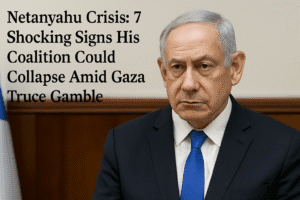Netanyahu Crisis: 7 Shocking Signs His Coalition Could Collapse Amid Gaza Truce Gamble
Israeli Prime Minister Benjamin Netanyahu is facing a severe political crisis as his coalition teeters on collapse amid delicate Gaza ceasefire negotiations. The ultra-Orthodox UTJ party’s resignation over military conscription exemptions slashed his majority to just 58 seats, with the Shas party possibly next to exit. While Netanyahu has a 48-hour window and a looming Knesset recess as a temporary buffer, his far-right partners threaten to quit if a ceasefire is pursued.
The core of the crisis lies in the long-standing societal rift over military exemptions, now intensified by the Gaza war’s toll. With over 450 Israeli soldiers killed, secular resentment is rising, while ultra-Orthodox factions defend their stance as religious obligation.
The Supreme Court’s ruling against blanket exemptions has cornered Netanyahu politically. Meanwhile, the fragile coalition and intense war fatigue are amplifying public discontent. Even if Netanyahu navigates the immediate threat, his government remains on a knife’s edge, with deeper ideological divides threatening its long-term viability.

Netanyahu Crisis: 7 Shocking Signs His Coalition Could Collapse Amid Gaza Truce Gamble
Israeli Prime Minister Benjamin Netanyahu is navigating treacherous political waters as a key ally bolted from his ruling coalition, dramatically narrowing his parliamentary majority just as delicate ceasefire negotiations gain momentum in Qatar.
The Immediate Crisis: Ultra-Orthodox Walkout Over Conscription
Overnight, the United Torah Judaism (UTJ) party, representing ultra-Orthodox Jews, delivered a potentially crippling blow. All six of its lawmakers resigned from parliamentary committees and government posts. Their core grievance? The government’s failure to guarantee permanent exemptions from mandatory military service for their religious seminary students.
This move isn’t just symbolic. It reduces Netanyahu’s coalition to a razor-thin 58 seats in the 120-member Knesset – the absolute bare minimum needed to govern. Worse, the closely allied Shas party, another ultra-Orthodox faction, is threatening to follow suit. Should Shas leave, Netanyahu would lose his majority entirely, triggering immediate political chaos.
A Narrow Lifeline, But Time is Tight
Despite the shock, Netanyahu isn’t immediately facing collapse. UTJ provided a critical 48-hour window before their resignations take full effect, offering a sliver of opportunity for crisis talks. Furthermore, the Knesset is scheduled to begin its summer recess at the end of July. If Netanyahu can limp through the next two weeks, he gains a crucial three-month breathing space to find a solution before parliament reconvenes and his tenuous grip could be formally challenged.
The Gaza Gambit: Ceasefire Talks Proceed Amidst Turmoil
Simultaneously, Netanyahu faces intense pressure from another flank regarding the Gaza war. Indirect negotiations between Israel and Hamas, mediated in Qatar, aim for a 60-day ceasefire. This initial pause would facilitate the release of half the remaining hostages held by Hamas and surge desperately needed aid into Gaza, while opening a path toward potentially ending the war entirely.
However, Netanyahu’s far-right coalition partners, National Security Minister Itamar Ben-Gvir and Finance Minister Bezalel Smotrich, vehemently oppose any ceasefire, demanding Israel press on with its military campaign. Their threats to bolt the coalition over a deal add another layer of instability.
Crucially, analysts suggest Netanyahu could potentially secure cabinet approval for a ceasefire deal even without the far-right ministers, relying on more centrist elements within his remaining coalition and tacit support from opposition parties weary of the war. A close Netanyahu aide, Topaz Luk, signaled confidence, stating, “As soon as the right deal is on the table, the prime minister will be able to pass it through.”
The Tinderbox Behind the Crisis: Military Exemptions
The ultra-Orthodox walkout exposes a deep, decades-old societal fault line in Israel: military service exemptions for religious students. This issue has become explosively potent during the grueling 21-month Gaza conflict.
- The Secular Resentment: Many mainstream Israelis, whose children serve mandatory terms, view the ultra-Orthodox exemptions as profoundly unfair, especially as the war exacts a heavy toll. Over 450 Israeli soldiers have been killed in Gaza combat since October 7th.
- The Ultra-Orthodox Stance: Ultra-Orthodox leaders argue that full-time Torah study is a sacred duty vital to Jewish survival. They fear military service will secularize their youth and erode their insular religious communities.
- The Legal Pressure: Last year, Israel’s Supreme Court ruled the decades-old exemption system must end, forcing parliament to draft new legislation. UTJ’s departure signals their belief Netanyahu failed to deliver a law preserving their core demand for blanket exemptions.
Why This Matters Beyond the Headlines:
- Netanyahu’s Balancing Act: The Prime Minister is now trapped between two existential threats: appeasing his ultra-Orthodox base to maintain government stability, and responding to growing war fatigue and international pressure by pursuing a Gaza truce. His political survival hinges on threading this needle.
- Gaza Ceasefire Window? Paradoxically, Netanyahu’s weakened domestic position might increase his incentive to strike a hostage deal. A successful ceasefire could temporarily boost his standing and deflect from the coalition crisis. However, his dependence on remaining hardliners simultaneously complicates concessions.
- A Nation’s Fatigue: The prolonged war, high casualties, and the unresolved hostage crisis have worn down Israeli society. The conscription debate intensifies this fatigue, highlighting perceived inequalities in sacrifice.
- A Fragile Foundation: Israel’s government rests on an inherently unstable coalition of deeply divergent ideologies. This crisis underscores how single-issue disputes can threaten the entire governing structure, potentially triggering an election Israel seems ill-prepared for mid-conflict.
Netanyahu has days, possibly weeks, to avert an immediate collapse. But even if he survives the summer, the fundamental tensions over military service and the trajectory of the Gaza war ensure his government remains perpetually vulnerable. The path forward demands concessions he may be politically unable, or ideologically unwilling, to make. The stability of Israel’s government, and the fate of potential peace efforts, hang precariously in the balance.
You must be logged in to post a comment.